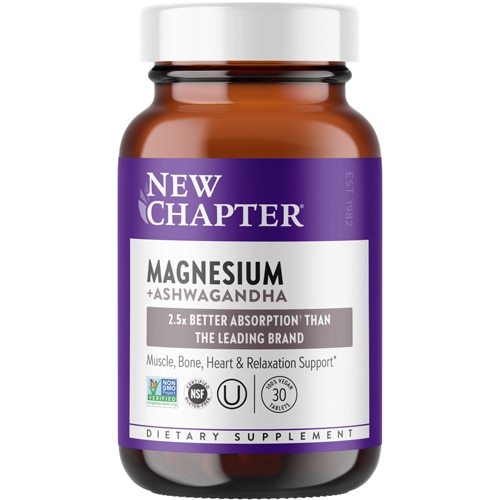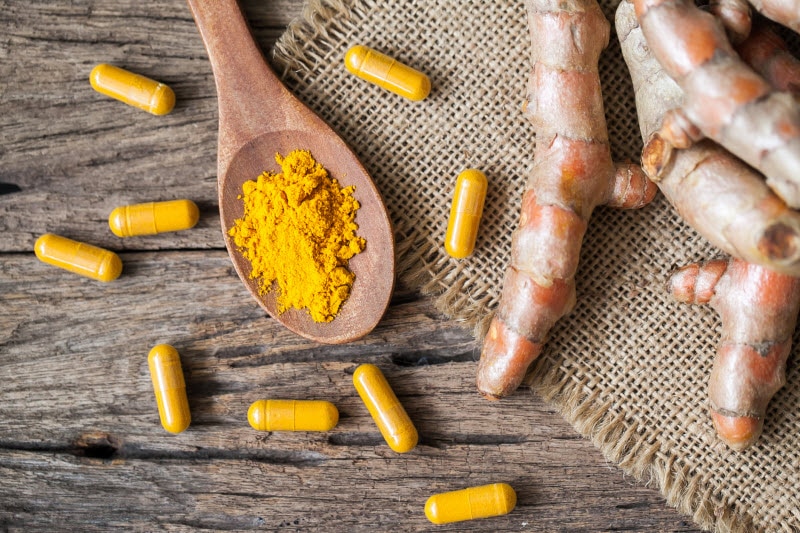Shop New Chapter at Vitacost
New Chapter Magnesium + Ashwagandha Description
- Nutrition Crafted For: Muscle, Bone, Heart & Relaxation Support
- 2.5x Better Absorption
- Muscle Recovery & More
- One-Daily Essential Mineral
- Potent Ashwagandha
- High-Quality TRAACS
- Non-GMO Project Verified
Americans aren’t getting enough Magnesium, partly because declining soil quality means our food is less nutritious than ever before. Signs of low magnesium include anxiety, fatigue, mood swings, sleep issues, and loss of appetite. Boost your levels of this essential mineral for everyday health with New Chapter’s high-quality Magnesium bisglycinate (also known as Magnesium glycinate) that’s 2.5x better absorbed than the leading form. Deepens calm, strengthens muscles & bones, and nourishes the heart and nervous system. With powerful, organic herbal adaptogen Ashwagandha to promote relaxation and stress relief. Formulated with lab-validated TRAACS (The Real Amino Acid Chelate System) Magnesium, shown by science to deliver this vital mineral in a form your body uses best, without laxative/GI effects.
• 2.5x Better Absorption than leading form: Highly bioavailable Magnesium glycinate your body can absorb well without any GI discomfort
• Muscle Recovery & More: Magnesium supplement enhances muscle and bone health, heart health, nerve transmission, and promotes calm & relaxation
• One-Daily Essential Mineral: Many Americans don’t get enough Magnesium due to declining quality of our soil, so this science-backed formula provides buffered Magnesium bisglycinate (also known as Magnesium glycinate) plus sea-sourced Magnesium with vital trace minerals
• Potent Ashwagandha: Soothing Ashwagandha is a proprietary herbal concentrate packed with bioactives to build resilience in the face of stressors
• High-Quality TRAACS (The Real Amino Acid Chelate System patented lab validation method) Magnesium bisglycinate plus sea-sourced full-spectrum Magnesium, Non-GMO Project Verified, Certified Gluten-Free by NSF, Certified Kosher, 100% Vegetarian, No Artificial Flavors or Colors, FDA & GMP compliant, 3rd-party tested
*These statements have not been evaluated by the Food and Drug Administration. This product is not intended to diagnose, treat, cure, or prevent any disease.
| Amount Per Serving | % Daily Value | |
| Magnesium (175 mg from seawater and 150 mg as TRAACS® magnesium bisglycinate chelate buffered from magnesium bisglycinate chelate and magnesium oxide) | 325 mg | 77% |
| Sensoril® (Withania somnifera) (root and aerial parts) aqueous extract | 25 mg | * |
Caution: As with any dietary supplement, you should advise your healthcare professional of the use of this product if you have a medical condition or are taking medication. If you are nursing, pregnant, or considering pregnancy, consult your healthcare professional prior to using this product. Some people may experience mild gastrointestinal symptoms due to magnesium sensitivity. Discontinue use and contact your healthcare professional if you experience a side effect or an allergic reaction. Do not exceed suggested use. Keep out of reach of children.





